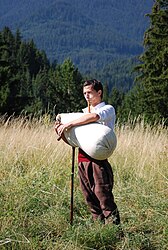This article has multiple issues. Please help improve it or discuss these issues on the talk page. (Learn how and when to remove these messages)
|
 | |
| Woodwind instrument | |
|---|---|
| Classification | Bagpipe |
| Hornbostel–Sachs classification | 422.112 (Reed aerophone with conical bore) |
| Related instruments | |
| |
The kaba gaida ('large gaida') or rodopska gaida (Rhodope gaida), is the bagpipe of the central Rhodope mountains, it is a distinctive symbol of Bulgarian folk music. It is made from wood, horn, animal skin and cotton, and is similar to the gaida, but lower pitched and usually with a larger bag. The chanter has a specific curve at the end, with a hexagonal section, and the shape of the channel inside the chanter is reverse cone. The most common drone tone on a kaba gaida is E.
The song "Izlel e Delio Haidutin", played on the kaba gaida and included on the Voyager Golden Record, was among the sounds selected to portray the diversity of human culture.
The gaida is played on weddings, celebrations and events. As people on the Balkans say: "A wedding without a bagpipe is like a funeral." Interest in the kaba gaida has been increasing and it is found on the ethno jazz scene.
References
- Timothy Rice, "Evaluating Artistry on the Bulgarian Bagpipe", in Ethnomusicological Encounters with Music and Musicians, 2011 ISBN 9781409420378, p. 112
- Bulgarian Kaba Gaida in E played by Corydale
- Kaba Gaida online training, workshops and music around the globe
- Kaba gaida
- Bulgarian dance music Archived 2017-11-08 at the Wayback Machine
- New Folk: The phenomenon of chalga in modern Bulgarian folk
This article relating to bagpipes is a stub. You can help Misplaced Pages by expanding it. |